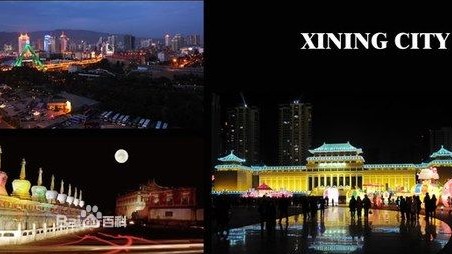Xining, or Ning in short, meaning “peace in the west”, is situated in the east of Qinghai Province, and lies in the upper reaches of the Huangshui River valley surrounded by mountains. Its geographic location is of strategic importance in ancient China. The city was a commercial hub along the Northern Silk Road's Hexi Corridor, and was a stronghold of the Han, Sui, Tang, and Song dynasties' resistance against nomadic attacks from the west. As the capital of Qinghai province in western China and the largest city on the Qinghai-Tibet Plateau, it is the political, economic, scientific, cultural and transport center and a major industrial base in Qinghai Province. Xining boasts time-honored history, splendid culture, abundant natural resources, colorful folk customs, known as a bright pearl in Qinghai-Tibet Plateau.
Xining is located on the eastern edge of the Qinghai-Tibet Plateau with an average altitude of about 2,261 meters (cordinates: Coordinates: 36°62′ N, 101°77′ E). Its terrain leans from north to south, looking like a small boat. Huangshui River and its tributaries converge in downtown and flow eastward across the whole city. Xining has also been dubbed the Summer Resort Capital of China owing to its cool summer, with a cold semi-arid climate. Conditions are influenced by the aridity and high altitude. Nights are cold or cool throughout the year, and the diurnal temperature often varies sharply. Rainfall falls mainly from May to September, and the area is often dry and sunny.
Xining is a typical immigration city that is replete with ethnic groups and religions. It is located in the junction of Loess Plateau and Qinghai-Tibet Plateau where the stock-raising area coexists with the farming area, so does the Han and Tibetan culture. It is the only city on the Qinghai-Tibet Plateau to achieve a population in the millions with more than 1 million immigrants, including 34 ethnic groups, such as Han Chinese, Tibetan, Mongolian, Hui, Salar, Tu, Zhuang, Manchu, Yao, Dong, Qiang, Uygur, etc. Tu is its unique ethnic minority and the minority group represent 25.55% of the total population, or 543,600 persons.
One of the inland cities open to the outside world selected by the State Council, Xining has established economic and cultural ties with other domestic and foreign cities and regions. The annual festivals, such as China Tulip Festival, Qinghai Green Economy Investment and Trade Fair, Tour of Qinghai Lake International Road Cycling Race, have made Xining, the Summer Resort Capital of China, more renowned at home and abroad. Thanks to its abundant animals and plants in the Plateau, natural minerals and hydroelectric resources, Xining has, in compliance with the Scientific Outlook on Development, decided to develop cyclic economy by comprehensively utilizing its resources, expanding its industrial chain, and nurturing highly complementary, distinguished and collaborative cluster sectors. By the end of 2012, the downtown of Xining covers an area of 150 kilometers with a population of 1.5 million.
